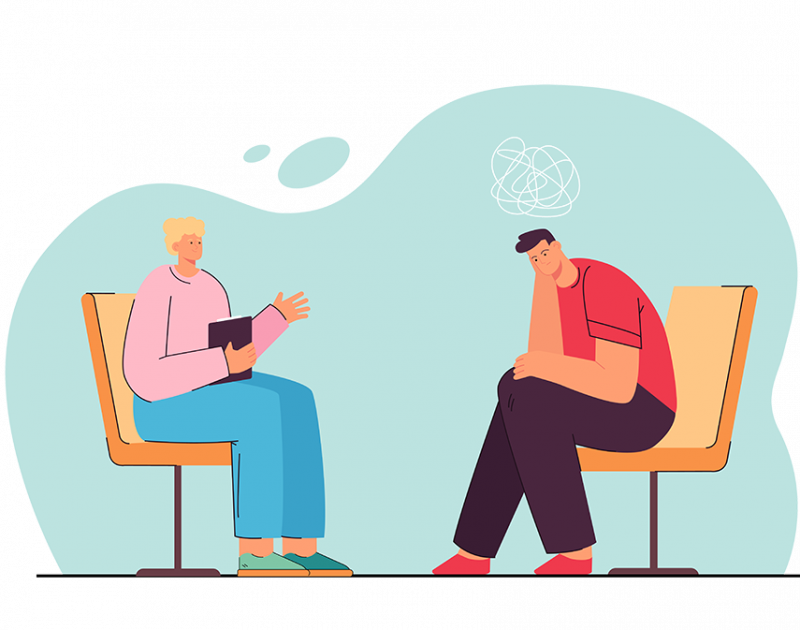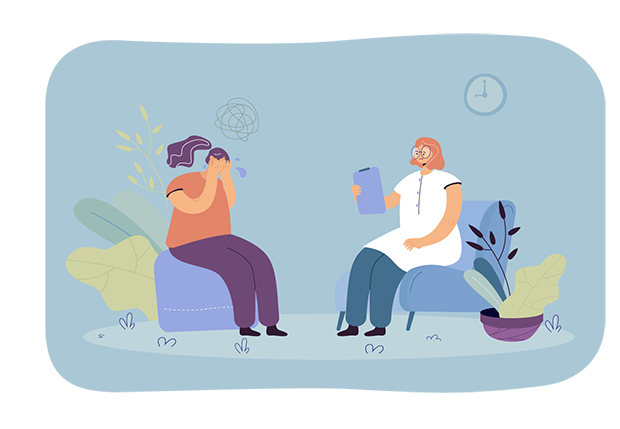TMS for Depression
Atlanta Integrative Psychiatry offers a dynamic array of innovative treatment options, including TMS therapy for depression, to help adults whose symptoms have not responded to medication or other types of therapy.
Medically Reviewed: Dr. Zohaib Haque
Author: Atlanta Integrative Psychiatry Team
Last Updated: May 8, 2024

What Is Depression?
Depression is a prevalent mental health condition that can have a significant negative impact on a person’s physical, psychological, and social well-being. Depression is a treatable condition – but many people don’t experience the relief they had hoped for after receiving traditional care.
Depressive disorders are among the most common mental illnesses in the United States and throughout the rest of the world. The World Health Organization estimates that depression affects about 280 million people across the globe. In addition, the National Institute of Mental Health (NIMH) has reported the following statistics about depression in the United States:
- In 2020, about 21 million adults (or about 8.4% of people aged 18 and above) had at least one major depressive episode.
- In the same year, about 4.1 million adolescents (or about 17% of the U.S. population in the 12-17 age range) had a major depressive episode.
- Major depressive disorder is much more common among adolescent girls (25.2%) and adult women (10.5%) than among adolescent boys (9.2%) and adult men (6.2%).
- About 66% of adults and 42% of adolescents who had depression received some form of treatment (which may include medication, therapy, or both).
How Does TMS Therapy Help with Depression?
Transcranial magnetic stimulation, or TMS therapy, is an FDA approved treatment for depression and has been shown to be effective in thousands of patients. Experts don’t yet completely understand exactly how TMS therapy achieves its beneficial effects, but here is a general description of what they believe happens during a session:
- The TMS therapist uses an electromagnetic coil to create brief magnetic pulses over the part of the brain that influences mood.
- These pulses pass painlessly through the skull, reaching just a few centimeters into the brain.
- Once in the brain, the pulses trigger minor electrical currents that prompt the release of neurotransmitters that are associated with elevated mood, motivation, joy, and pleasure.
Signs and Symptoms of Depression
The symptoms of a depressive disorder can vary from one person to the next, depending on factors such as the individual’s age, the type of disorder they have, and if they are also struggling with a co-occurring mental health concern. In general, though, most people with depression will experience some or all of the following types of symptoms:
- Subdued mood
- Overwhelming sadness
- Low energy and persistent fatigue
- Changes in appetite (which can include eating much more or much less than usual)
- Unintentional weight gain or loss
- Hypersomnia (sleeping too much) or insomnia (having difficulty getting to sleep and staying asleep)
- Lack of interest in hobbies, activities, or topics that used to be important to them
- Difficulty focusing or concentrating
- Anhedonia (inability to experience pleasure)
- Pulling away from family and friends
- Pervasive sense of worthlessness, hopelessness, and/or helplessness
- Recurrent thoughts of death and dying
Untreated depression can have a catastrophic impact on a person’s life. But depressive disorders are treatable conditions. When a person receives effective care, which may include TMS therapy for depression, they can experience symptom relief and achieve improved quality of life.

Types of Depression that TMS Treats
TMS therapy for depression can be effective for people whose lives have been disrupted by any type of depressive disorder.The two most common forms of depression are major depressive disorder (MDD) and persistent depressive disorder (PDD):
- Major depressive disorder causes severe symptoms that last most of the day, most days, for a period of at least two weeks. These symptoms will be intense enough to impair a person’s ability to function in school, at work, or in other important areas of life.
- Persistent Depressive Disorder: PDD involves symptoms that are usually less severe than major depressive disorder, but which last for at least two years. During this period, a person may also have major depressive episodes.
What Are The Risks of TMS For Depression? Is It Safe?
Our TMS therapy in Atlanta follows a protocol similar to most other forms of TMS therapy. During treatment, an electromagnet is placed on the scalp, and a series of magnetic pulses are sent to the targeted areas of the brain. These pulses stimulate the nerve cells, which can help improve the symptoms of the disorder being treated.
Depending on the condition and the patient’s individual needs, treatment sessions typically last 30-45 minutes and are repeated up to 5 times per week for up to 6 weeks. After a course of treatment, many patients experience a significant improvement in their symptoms.
Benefits of TMS Therapy For Depression
The benefits that a person receives from any type of mental health treatment can vary depending on several personal factors. In the case of TMS therapy for depression, potential benefits include the following:
- Convenience: TMS therapy for depression can be provided via brief outpatient sessions. This minimizes the impact on your daily schedule.
- Convenience: TMS therapy for depression can be provided via brief outpatient sessions. This minimizes the impact on your daily schedule.
- Safety: As we noted earlier, TMS therapy for depression is a safe procedure that does not require medication or sedation. Your risk for serious side effects is minimal.
- Comfort: TMS therapy places virtually no strain on your body. You will be seated in a comfortable chair during the session, and you will be awake and alert throughout the session.
- Symptom relief: Perhaps the most important potential benefit of TMS therapy for depression is that it can provide long-term relief from symptoms that have not been alleviated by prior treatment involved medication and therapy.
- Renewed hope: If you have struggled with treatment-related depression, you may have begun to believe that you had no hope of experiencing improved health. A successful experience with TMS therapy for depression can lead to significant improvements in your mental health and your outlook on life.

How TMS in Atlanta Works
Here’s a quick overview of what you can expect when you participate in a TMS therapy session at our treatment center in Atlanta:
- You will be seated in a comfortable chair.
- The professional who provides your care may give you earplugs or other protection, because the machine that generates the magnetic pulses can be loud.
- The professional will place a small magnet on your scalp. The magnet may be part of a helmet that you wear, or it may be positioned via another means.
- You may feel a light tapping sensation as the professional activates the machine that delivers the electromagnetic pulses.
- You may hear a clicking sound as the magnet turns on and off throughout the procedure.
- When the session is complete, you should be able to immediately resume any normal activities, such as driving a car or going back to work.
Untreated depression can have a catastrophic impact on a person’s life. But depressive disorders are treatable conditions. When a person receives effective care, which may include TMS therapy for depression, they can experience symptom relief and achieve improved quality of life.
Begin TMS Therapy for Depression Today!
When you’re ready to begin your journey toward a healthier and more hopeful tomorrow, the Atlanta Integrative Psychiatry team is here for you. To learn more or to schedule a free assessment, please visit our Appointment page or call us today.
Find Mental Health Treatment Today
Atlanta Integrative Psychiatry is an Industry leader in mental health treatment . Our team of top medical experts specialize in dual diagnosis treat and are committed to ensuring that each patient is treated as an individual.
Call us today, we're avialable 24/7.




